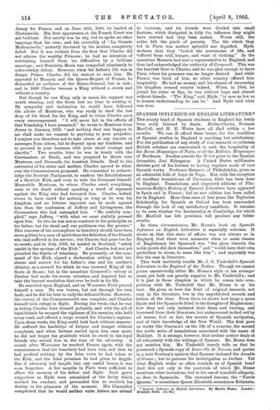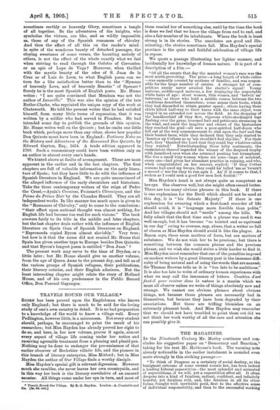SPANISH INFLUENCE ON ENGLISH LITERATURE.* THE scanty band of Spanish
students in England has lately been sadly thinned by death. Butler-Clarke, Norman MacColl, and H. E. Watts have all died within a few months. We can ill afford these losses, for the condition of Spanish studies in England is anything but satisfactory. For the publication of any study of real research or criticism British scholars are constrained to seek the hospitality of the Benue Hispanigue of Paris, or of the Bulletin Hispanigue of Bordeaux. Sweden awards the Nobel prize to the Spanish dramatist, Jose Echegaray. A United States millionaire devotes part of his fortune to having reprints made of rare Spanish works. Professor Rennert, of Philadelphia, gives us an admirable Life of Lope de Vega. But, with the exception of excellent translations of Cervantes, little has been done In England. Translations and improved editions of Fitz- maurice-Kelly's History of Spanish Literature have appeared in Spain and in France ; but no new edition has been called for in England. More than once of late years the Taylorian Scholarship for Spanish at Oxford has been unawarded through the lack of any satisfactory candidate. It remains to be seen whether the Lectureship at Cambridge for which Mr. MacColl has left provision will produce any better results.
In these circumstances, Mr. Hume's book on Spanish Influence on. English Literature is especially welcome. It shows us that this state of affairs was not always so in England, that there were moments when to some classes of Englishmen the Spaniard was "the glass wherein the noble youth did deck themselves," and "would turn their own perfection to abuse, to seem like him " ; and especially was this the case in literature.
This work inevitably recalls Mr. J. G. ITnderhill's Spanish. Literature in the England of the Tudors. Though we cannot praise unreservedly either Mr. Hume's style or his arrange- ment, yet both are greatly superior to Mr. -Underhill's; and it is just in those chapters in which he comes into com- petition with Mr. Underhill that Mr. Hume is at his beat. He gives us here the fruit of original research, not only in the literature, but in the unpublished records and letters of the time. From these he shows how large a space Spain and the Spaniards filled in the thoughts of Englishmen; how they not only imitated their dress and bearing, and borrowed from their literature, but endeavoured to find out by all means, foul or fair, the secrets of Spanish navigation, and of their knowledge of the New World. The first gave us works like Guevara'e on the life of a courrier, the second the noble series of translations associated with the name of Hakluyt. It is strange, however, that neither author deals at all adequately with the writings of Spenser. Mr. Hume does not mention him. Mr. Underhill merely tells us that he possessed a Spanish copy of Lazarillo de Tonnes, and quotes in a note Southey's opinion that Spenser imitated the Amadis of Greece ; but he pursues his investigation no further. Yet what English writer so often reminds us of Spanish lore P And this not only in the pastorals of which Mr. Hume mentions other imitations, but in his use of manifold allegory, so dear to Spaniards. The unnamed heroine, the " Faerie QUeelle," is sometimes Queen Elizabeth, sometimes Britannia, • Spanish infiusnes on English Literature. By Martin Hams. London : Ereleggh Nash [7s. 65.] sometimes earthly or heavenly Glory, sometimes a tangle of all together. So the adventures of the knights, who symbolise the virtues, are like, and as wildly impossible 'as, those of any of the Spanish romances of chivalry. And then the effect of all this on the reader's mind : in spite of the wondrous beauty of detached passages, the cloying sweetness of some verses, the haunting melody of others, is not the effect of the whole exactly what we feel when striving to read through the Galatea of Cervantes, or an epic of Lope de Vega ? Moreover, when thrilled with the mystic beauty of the odes of S. Juan de la Cruz or of Luis de Leon, to what English poem can we turn for a like satisfaction better than to the " Hymnes of heavenly Love, and of heavenly Beautie " of Spenser ? Surely he is the most Spanish of English poets. Mr. Hume writes : "I am quite convinced that Mendoza was not the author of Lazarillo." This was also the opinion of the late Butler-Clarke, who reprinted the unique copy of the work at Chatsworth. He told the present writer that be had satisfied himself, from many little turns of expression, that it was written by a soldier who had served in Flanders. He had intended some day to publish the grounds of this opinion. Mr. Hume writes well on the Quixote ; but he omits one little book which, perhaps more than any other, shows how popular Don Quixote must have been in England : Festivous Notes on, the History and Adventures of the Renowned Don, Quixote, by Edward Gayton, Esq., 1654. A trade edition appeared in 1768. Such a commentary could have been written only on an author in almost every one's hands.
We hinted above at faults of arrangement. These are most apparent in the earlier and in the last chapters. The first chapters are full of valuable information on the early litera- ture of Spain; but they have little to do with the influence of Spanish literature in England. We are quite unconvinced of the alleged influence of the early chroniclers and historians. Take the three contemporary writers of the reign of Pedro the Cruel,—Ayala's Cronicas, Froissart's Chronigues, and the Poems du Prince Noir by the Chandos Herald. They are all independent works. In like manner too much space is given to the "Romances of Chivalry," only to come to the conclusion: "their effect upon national thought was almost nothing, for English life had, become too real for such visions." The book answers fairly to its title in the middle and later chapters, but the last chapter deals rather with the influence of English literature on Spain than of Spanish literature on England. " Espronceda copied Byron almost slavishly." Very true ; but how is it that the name did not remind Mr. Hume that Spain has given another type to Europe besides Don Quixote, and that Byron's longest poem is entitled "Don Juan" ?
The present work may serve to the time of Dryden, or a little later ; but Mr. Hume should give us another volume, from the age of Queen Anne to the present day, and tell us of the various groups of Spanish refugees, their publications, their literary coteries, and their English admirers. Not the least interesting chapter might relate the story of Holland House, and of his own predecessor in the Public Record Office, Don Pascual Gayangos.











































 Previous page
Previous page